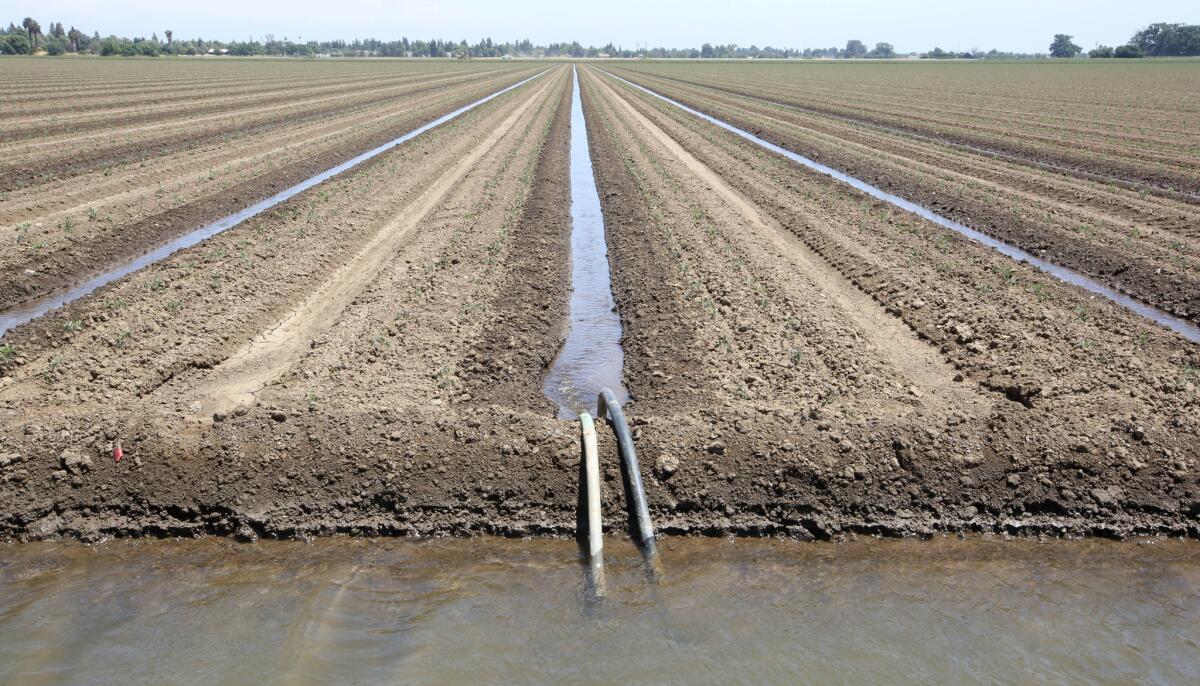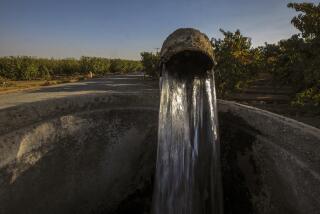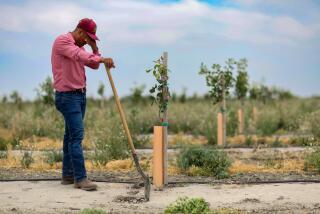Most water rights holders facing cuts miss state compliance deadline

Most of the water right holders affected by curtailment orders have missed a state deadline for establishing their compliance, officials said Monday.
The majority of California growers, irrigation districts and others who have been ordered to stop drawing water from rivers and streams due to worsening drought conditions have failed to register their compliance before an official deadline, officials said Monday.
In what one spokesman described as a “disappointing” development, the State Water Resources Control Board released figures showing that 31% of affected water right holders had officially responded to their curtailment orders.
When water right holders receive a shutoff order, they have seven days to submit a certification form to the water board, officials said.
Right holders who fail to heed a curtailment order and continue drawing water are subject to fines of up to $1,000 a day and $2,500 per acre-foot of unlawfully diverted water.
It remains unclear exactly why the response rate is so low, and water board officials said they were still studying the matter. However, at least one water rights attorney said that simple oversight might be a factor.
“Most of them are small mom-and-pop operations,” Sacramento attorney David Aladjem said. “Most of the small farmers I have worked with over the years are very good in terms of doing what they need to do to get a crop in, but they’re not so good on paperwork.”
Of the 9,112 curtailment orders issued to senior and junior right holders this year, only 2,814 had generated responses, according to the water board.
“I would think that the low response … is a little disappointing,” said Timothy Moran, a water board spokesman.
However, the figures also showed that response rates among large-volume water users were much higher.
“If you look at it according to water demand, the response is 78%,” Moran said. “That indicates the ones who are responding are the large water users.”
The vast majority of curtailment orders issued have affected so-called junior right holders, or those entities whose legal claim to water dates back to 1914.
A much smaller number of curtailment orders, 277, affected senior right holders -- those whose rights date to before 1914. Those orders were announced June 12, and depending on when the right holder received the notice, their response window may still be open.
A number of Central Valley senior right holders have filed suit against the water board, arguing that their rights were curtailed without due process, or proper authority.
On Monday, representatives from two irrigation districts who are litigating the senior right curtailments said they did not see how the water board could limit their water use when the board had yet to receive shutoff confirmation from junior right holders.
“Until they are compliant, why should senior water users in our ag district be asked to give up one acre-foot of water?” said Steve Knell, general manager of the Oakdale Irrigation District. He charged that some junior right holders were still drawing water in violation of shutoff orders.
At the South San Joaquin Irrigation District, general manager Jeff Shields said he was surprised to see such a low rate of response among junior right holders. However, he said there could be legal reasons why senior right holders would not respond.
“It will be difficult for those of us that have filed litigation against the state water board challenging their jurisdiction to turn around and file a compliance certification,” Shields said.
Despite accusations that some rights holders were violating restrictions, Aladjem said that if last year was any indication, instances of cheating should be rare.
“Last year, when the state water board went out and did their inspections, they found most people were abiding by the restrictions,” Aladjem said. “Given how severe the drought is this year, I’d expect things to be the same. There will be some cheating, but upward of 90% will comply.”
Twitter: @montemorin
More to Read
Sign up for Essential California
The most important California stories and recommendations in your inbox every morning.
You may occasionally receive promotional content from the Los Angeles Times.











